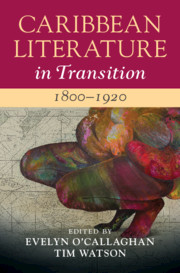Book contents
- Caribbean Literature in Transition, 1800–1920
- Caribbean Literature in Transition
- Caribbean Literature in Transition, 1800–1920
- Copyright page
- Contents
- List of Illustrations
- Contributors
- Acknowledgements
- Introduction
- Part I Literary and Generic Transitions
- Chapter 1 Conquest Narratives
- Chapter 2 Creole Testimonies in Caribbean Women’s Slave Narratives
- Chapter 3 Jonkanoo Performances of Resistance, Freedom, and Memory
- Chapter 4 Caribbean Picturesque from William Beckford to Contemporary Tourism
- Chapter 5 From Novels of the Caribbean, to Caribbean Novels
- Chapter 6 Early Caribbean Poetry and the Modern Reader
- Chapter 7 Towards a West Indian Romance Poetics
- Part II Cultural and Political Transitions
- Part III The Caribbean Region in Transition
- Part IV Critical Transitions
- Bibliography
- Index
Chapter 6 - Early Caribbean Poetry and the Modern Reader
from Part I - Literary and Generic Transitions
Published online by Cambridge University Press: 16 December 2020
- Caribbean Literature in Transition, 1800–1920
- Caribbean Literature in Transition
- Caribbean Literature in Transition, 1800–1920
- Copyright page
- Contents
- List of Illustrations
- Contributors
- Acknowledgements
- Introduction
- Part I Literary and Generic Transitions
- Chapter 1 Conquest Narratives
- Chapter 2 Creole Testimonies in Caribbean Women’s Slave Narratives
- Chapter 3 Jonkanoo Performances of Resistance, Freedom, and Memory
- Chapter 4 Caribbean Picturesque from William Beckford to Contemporary Tourism
- Chapter 5 From Novels of the Caribbean, to Caribbean Novels
- Chapter 6 Early Caribbean Poetry and the Modern Reader
- Chapter 7 Towards a West Indian Romance Poetics
- Part II Cultural and Political Transitions
- Part III The Caribbean Region in Transition
- Part IV Critical Transitions
- Bibliography
- Index
Summary
This essay emphasizes the considerable volume of literature, especially poetry, written and/or printed and published in the Caribbean, or published elsewhere by writers with a significant connection to the region by birth or residence, from the later seventeenth century to the early twentieth. It argues that seeing the Caribbean as part of a pan-Atlantic literary sphere enables a better understanding of these works. What Kamau Brathwaite called ‘the tyranny of the model’, and the dichotomy between conventional poetic diction and Caribbean vernaculars is explored, and the role of Latin verse as cultural capital is noted. While it is acknowledged that most of this material is the poetry of an educated elite, directly or indirectly involved in maintaining slavery and the plantation system, and that, as such, it will seem problematic to modern readers, it is suggested that it nevertheless offers a useful field of research to the cultural historian.
Keywords
- Type
- Chapter
- Information
- Caribbean Literature in Transition, 1800–1920 , pp. 101 - 118Publisher: Cambridge University PressPrint publication year: 2021

